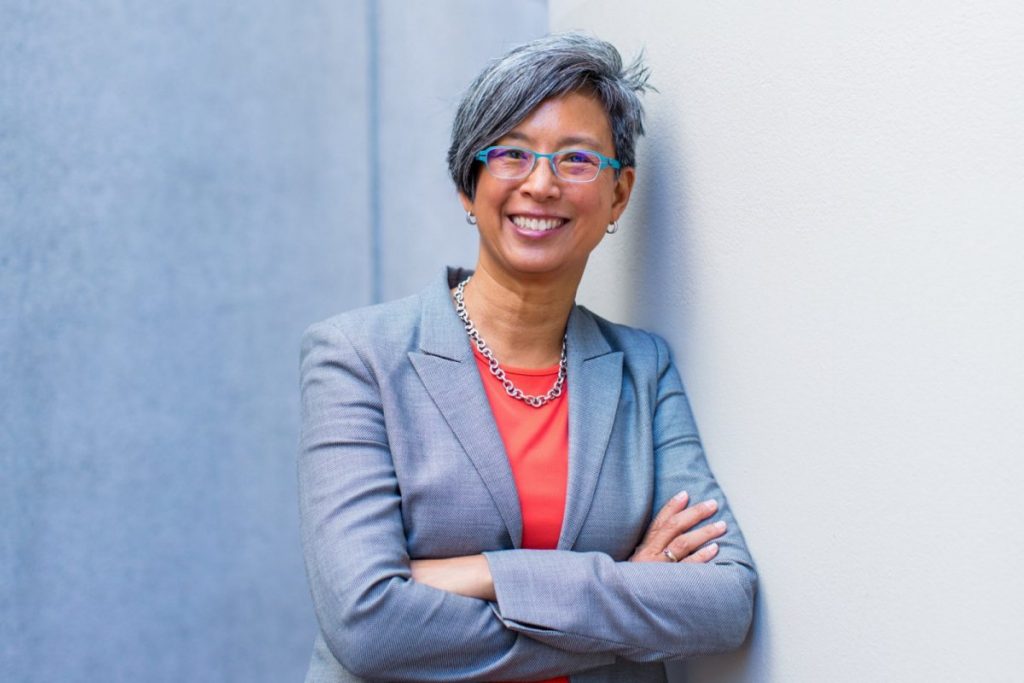
Toasting Women Who Tech: Ann Mei Chang

“I realized people were looking at technology as a quick fix, instead of looking at whether it fits the purpose. I started shifting from focusing on technology so much, to what I think of innovation, the how, the process for getting there, where technology may in fact be the best answer, but we need to start by asking the right questions.”- Ann Mei Chang
On March 29, Hitachi Center for Technology and International Affairs hosted Ms. Ann Mei Chang as part of their “2021 Toasting Women Who Tech” speaker series. You can watch the session here.
Ms. Chang started her work in the “Pre-web” world, where technology meant very different than what it does now.
From wanting to be a mathematician in elementary school, to teaching herself programing in junior high in an Atari 400 computer, Ms. Chang’s journey with tech started quite early and she credits it to her love for math and video games.
As a freshman student at Stanford University, Ms. Chang wanted to major in Mathematics. However, she found it too theoretical and wanted to do something that was more relevant to the real world. She was a student member of the committee that launched the first Computer Science major for undergraduate students at Stanford University, and switched herself.
Ms. Chang recalls the culture of the Silicon Valley encouraged more male patterns of work than female. She mentions that male engineers who worked all night to make the last bit of fixes in their codes were the ones to be rewarded over women who tested and finetuned their codes early- because they couldn’t stay over. Such difference in norms of work was not recognized at the time, she mentions.
Ms. Chang has male role models in her career and never felt role models had to be of the same gender. At 24, she was promoted as the youngest manager. In her mid 20s, she made a decision to invest the first half of her career in the private sector, and the second half in the social sector- using technology to create something that betters the world. People thought she was crazy, but in her last role at Google she started an initiative that merged both of those goals. Ms. Chang launched the Google’s Emerging Markets initiative that focused on underserved markets.
In her last year at Google, she was invited to join the first State Department Women’s tech delegation to Liberia and Sierra Leone, to look at how technology could improve the lives of women and girls. The team was led by Anne-Marie Slaughter, who helped Ms. Chang get a mid-career fellowship at the US State Department, where she worked while on leave from Google. Ms Chang ended up resigning and extending the fellowship and launched her journey into the public sector.
Ms. Chang realized how people looked at technology as a quick fix, while it was more important to ask the right questions.
“How do we become more nimble as organizations and how we design programs, how do we become more user centric and how we design programs, how do we think about the long term scalability of the work that we’re doing so that we really are trying to impact the full scope of the problem you know a lot of the sort of thinking that was kind of bread into my system from working in Silicon Valley, but really just had not been adopted in these spaces very widely.”
Ms. Chang ‘s work took her to USAID and later on to writing her book, Lean Impact. Lean Impact was inspired by The Lean Startup, authored by Eric Ries. Eric worked for Ms. Chang at a startup company almost two decades ago. Eric and Ms. Chang came into what she calls an ‘Unusual arrangement’ where Eric wrote the foreword for her book and they shared the branding.
“When it comes to social sector, the very reason, the social sector exists is because something’s not working right. Like if things were working then the private sector and government sector would be taking care of it. (Which means) we don’t know the answer yet and we need to recognize this when we’re trying to tackle a problem, then take a different approach. What that requires is that, for us to be able to take more risks, to be nimbler, to try more different things , it’s logical if you know the answer and then just execute on that.”
Ms. Chang thinks one of the few good news that came out of the ongoing pandemic is that about 700 foundations lifted restrictions from their grants, allowing the NGOs to make their own decisions. The hope is that it continues to more unrestricted funding beyond. It has also made the non-profits become more nimble, to learn more with the minimum resources and time.
“I’m a big fan of cross sectoral, multi-disciplinary work. I think what is really important for anything to be successful, is to really be able to bring a bunch of different perspectives to the table.”
For students and professionals who find themselves in such multi-disciplinary work as generalists, Ms. Chang advises finding an anchor- even if one has to be master of many trades, there should be one thing that they do better than most people, and investing in it.
In response to Fletcher Alumni Kelly Church’s question, Ms. Chang mentions what the non-profit world has done very well in terms of technology, is focusing more on basic technology like mobile money and sms/IVR based services, over Blockchain, to identify contexts where they work or don’t work.
On questions on accountability, Ms. Chang mentions how it is so much more difficult to get feedback in non-profit sector compared to private sector where it is a lot simpler and built into business as usual. She also emphasized the importance of tiered funding approach (similar to Venture Capitals) and relevant success matrices for the funders to create more impact.
Dr. Carolyn Gideon, Director, Hitachi Center for Technology and International Affairs, moderated the discussion with several alums and students from the Fletcher School, Tufts University, as well as Harvard University present in the audience.
Written by Masrura Oishi
